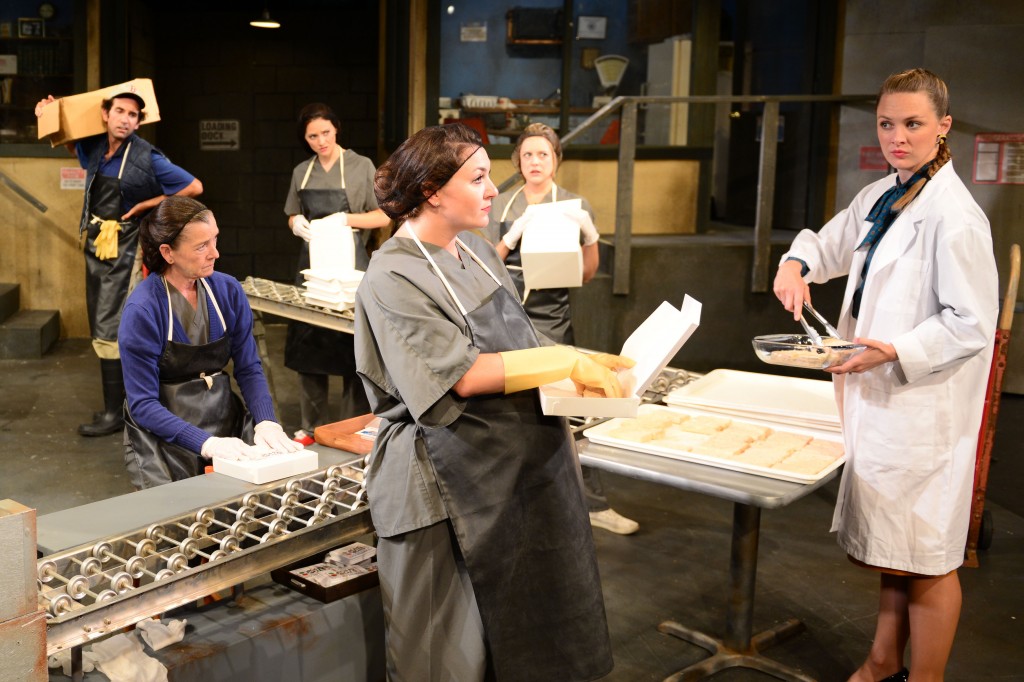Fuse Theater Review: “North Shore Fish” at the Gloucester Stage Company — Not So Fresh
North Shore Fish introduces, but then glosses over, the potent issues of working-class women struggling to support their families in dead-end factory jobs while their fisherman husbands remain out of sight.
North Shore Fish by Israel Horovitz. Directed by Robert Walsh. Staged by the Gloucester Stage Company, Gloucester, MA, through August 4.
By Terry Byrne.

Florence (Aimee Doherty) and Porker (Thomas Phillip O’Neill) embrace in the Gloucester Stage Company production of “North Shore Fish.” Photo: Gary Ng.
North Shore Fish attempts to capture the feel of Gloucester, the city playwright Israel Horovitz called home for many summers. But for this play, Horovitz crams so much melodrama into the plot he strains credibility and misses the opportunity to portray individuals in the midst of a seismic transition.
Set in a Gloucester fish-packing plant called North Shore Fish, Inc. during the 1980s, when the last of the fish processing plants were dying off, Horovitz offers a day in the life of the plant workers. An assortment of female stereotypes—along with two males—populates the factory floor, including the grandmotherly Arlene (Nancy E. Carroll), a longtime veteran of the plant; her very pregnant daughter Ruthie (Brianne Beatrice); Florence (Aimee Doherty), who’s having an affair with the foreman; sassy but sad Josie (Marianna Armitstead); and Maureen (Erin Brehm), who’s training her cousin Marlena (Esme Allen) to fill in for her when Maureen goes on vacation.
The two male characters in the plant serve as bookends: Porker (Thomas Phillip O’Neill) mops the floor and accepts the teasing of the women and the abuse of the foreman, Sal (Lowell Byers), a high-strung lothario who bullies, sexually harasses and threatens his workers, and even a food inspector (Therese Plaehn) in the name of keeping the company’s doors open.
In this revival, director Robert Walsh provides the proceedings with a purposeful flow, including some impressively choreographed fight scenes. He’s also cast a dynamic ensemble that does its best with the little it has to work with. The standouts here include Doherty, Armitstead, and O’Neill, each of whom finds something unexpected in these stock characters. Doherty sheds the elegant ingénue style she’s perfected in local musical theater in favor of a desperate, potty-mouthed woman who has backed herself into a corner with nowhere to go. Armitstead manages to soften the edges of a cartoonish figure into someone the audience can care about, while O’Neill (grandson of Tip) finds the lonely, tentative man behind the buffoonish “Porker.”

L to R: Porker meets the new girl: Maureen (Erin Brehm), Porker (Thomas Phillip O’Neill) and the new girl, Marlena (Esme Allen) in the Gloucester Stage Company production of NORTH SHORE FISH. Photo: Gary Ng.
But Horovitz hews so closely to a painfully predictable plot that, despite Walsh’s attention to movement, the play starts to feel as lifeless and as pointless as the processed fish sticks the workers endlessly pack and repack. The script introduces, but then glosses over, the potent issues of working-class women struggling to support their families in dead-end factory jobs while their fisherman husbands remain out of sight. The playwright also adopts a condescending tone when considering these blue-collar workers’ approaches to confrontation. By constantly offering sex or violence as the only tools available to them, Horovitz rules out any possibilities for complexity that might have made his characters interesting.
Near the end of the play, Horovitz offers one of his characters a monologue in which she muses on the fate of folks who’ve lived their lives overlooking the water but pay a heavy price for the privilege. It’s a rare insight into a moment of cultural change for a dying fishing community and the people who’ve made their living there, but like the efforts inside the North Shore Fish factory, it’s too little, too late.
